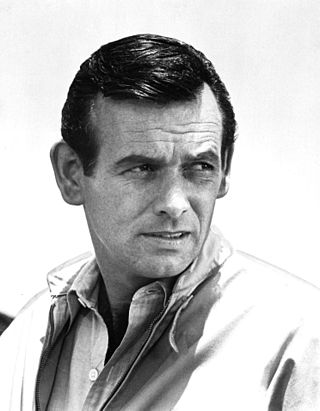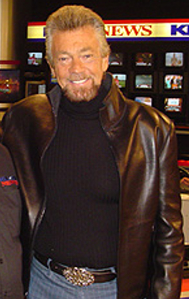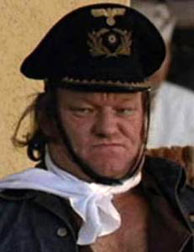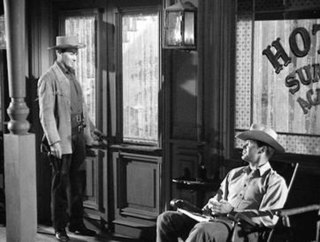
David Janssen was an American film and television actor who is best known for his starring role as Richard Kimble in the television series The Fugitive (1963–1967). Janssen also had the title roles in three other series: Richard Diamond, Private Detective; O'Hara, U.S. Treasury; and Harry O.

William Wayne McMillan Rogers III was an American actor, known for playing the role of Captain "Trapper" John McIntyre in the CBS television series M*A*S*H and as Dr. Charley Michaels on House Calls (1979–1982).

The Rockford Files is an American detective drama television series starring James Garner that aired on the NBC network from September 13, 1974, to January 10, 1980. Garner portrays Los Angeles private investigator Jim Rockford, with Noah Beery Jr. in the supporting role of his father, Joseph "Rocky" Rockford, a retired truck driver. The show was created by Roy Huggins and Stephen J. Cannell. Huggins had created the television show Maverick (1957–1962), which starred Garner, and he wanted to create a similar show in a modern-day detective setting. In 2002, The Rockford Files was ranked No. 39 on TV Guide's 50 Greatest TV Shows of All Time.

Stephen Joseph Cannell was an American television producer, writer, novelist, occasional actor, and founder of Cannell Entertainment and The Cannell Studios.

Hunter is an American crime drama television series created by Frank Lupo, which ran on NBC from September 18, 1984, to April 26, 1991. It stars Fred Dryer as Sgt. Rick Hunter and Stepfanie Kramer as Sgt. Dee Dee McCall. The title character Sgt. Rick Hunter is a wily, physically imposing, often rule-breaking homicide detective with the Los Angeles Police Department.

Douglas Osborne McClure was an American actor whose career in film and television extended from the 1950s to the 1990s. He is best known for his role as the cowboy Trampas during the entire run from 1962 to 1971 of the series The Virginian and mayor turned police chief Kyle Applegate on Out of This World. From 1961-1963, he was married to actress BarBara Luna.

The Fugitive is an American crime drama television series created by Roy Huggins and produced by QM Productions and United Artists Television. It aired on ABC from September 17, 1963 to August 29, 1967. David Janssen starred as Dr. Richard Kimble, a physician who is wrongfully convicted of his wife's murder and sentenced to death. En route to death row, Dr. Kimble's train derails over a switch, allowing him to escape and begin a cross-country search for the real killer, a "one-armed man". At the same time, Richard Kimble is hounded by the authorities, most notably by Police Lieutenant Philip Gerard.

John William Saunders III, better known by the stage name John Quade, was an American character actor who starred in film and in television. He was best known for his role as Cholla, the leader of the motorcycle gang the Black Widows in the Clint Eastwood films Every Which Way but Loose (1978) and its sequel Any Which Way You Can (1980).

Profit is an American drama television series that originally aired in 1996 on the Fox Broadcasting Company. The series was created by David Greenwalt and John McNamara, and starred Adrian Pasdar as the eponymous lead character Jim Profit. In February 2008 repeat episodes began airing on Chiller, and in October 2010 on CBS Action.
Roy Huggins was an American novelist and an influential writer/creator and producer of character-driven television series, including Maverick, The Fugitive, Hunter, and The Rockford Files. He became a noted writer and producer using his own name, but much of his later television scriptwriting was done using the pseudonyms Thomas Fitzroy, John Thomas James or John Francis O'Mara.
Elaine Joyce is an American actress.

Patrick John Morrison, better known by his stage name Patrick Wayne, is an American actor. He is the second son of movie star John Wayne and his first wife, Josephine Alicia Saenz. He made over 40 films, including eleven with his father.
City of Angels may refer to:

Toma is an American crime drama television series that ran on ABC from March 21, 1973, to May 10, 1974. The series stars Tony Musante as the real-life detective Dave Toma, who was a master of disguise and undercover work. Susan Strasberg and Simon Oakland play his wife and his boss.

"Shady Deal at Sunny Acres", starring James Garner and Jack Kelly, remains one of the most famous and widely discussed episodes of the Western comedy television series Maverick. Written by series creator Roy Huggins (teleplay) and Douglas Heyes (story) and directed by Leslie H. Martinson, this 1958 second-season episode depicts gambler Bret Maverick being swindled by a crooked banker after depositing the proceeds from a late-night poker game. He then surreptitiously recruits his brother Bart Maverick and a host of other acquaintances to mount an elaborate sting operation to recover the money.

I Love Trouble is a 1948 American film noir crime film written by Roy Huggins from his first novel The Double Take, directed by S. Sylvan Simon, and starring Franchot Tone as Stuart Bailey. The character of Stuart Bailey was later portrayed by Efrem Zimbalist, Jr. in the television series 77 Sunset Strip.

Hawk is a crime drama series starring Burt Reynolds, which aired on ABC from September 8, 1966 to December 29, 1966. The Screen Gems series was Reynolds' first starring role in a television series since leaving Gunsmoke the previous year.
The Outsider is an American detective drama created by Roy Huggins and starring Darren McGavin. A two hour pilot movie aired on November 21, 1967; about a year later, a regular series of 26 episodes aired on NBC for one season from September 18, 1968, until April 16, 1969.















